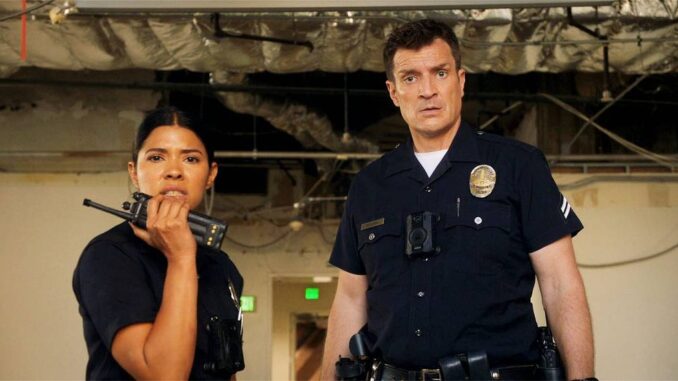
In an age saturated with meticulously curated content, where every new procedural aims for slicker visuals and more palatable narratives, a bold claim resurfaces: the true zenith of cop dramas aired decades ago. Specifically, 31 years ago (close enough to 32 for the spirit of the argument), NYPD Blue burst onto television screens, a gritty, unvarnished portrayal of police work that, even today, makes the popular, charming, and altogether cleaner The Rookie feel, well, like a rookie.
Let's be clear: The Rookie is entertaining. It’s got a likeable cast, a light touch, and often delivers satisfying, albeit predictable, resolutions. John Nolan’s journey from a middle-aged construction worker to LAPD beat cop is inherently appealing. It’s the kind of show you can comfortably binge-watch, a reliable source of feel-good heroism with just enough personal drama to keep things interesting. But NYPD Blue wasn't about comfort; it was about truth, delivered with the force of a punch to the gut.
From its pilot episode in 1993, NYPD Blue reveled in the moral grime and palpable stress of its environment. It was sweat-soaked, smoke-filled, and rife with dialogue that didn't just push boundaries but gleefully obliterated them. The camera, handheld and often shaky, mirrored the chaotic, uncertain lives of its detectives in the 15th Precinct. This wasn't a pristine, brightly lit police station; it was a character in itself – a labyrinth of worn linoleum, overflowing ashtrays, and fluorescent lights that hummed with exhaustion. You could practically smell the stale coffee and despair emanating from the screen. The Rookie, by contrast, operates in a world of sleek squad cars and sun-drenched Los Angeles streets, where even the grittiest crime scene feels carefully lit. Its problems are often solved with a quip and a car chase, while NYPD Blue's lingered, staining the souls of those who wrestled with them.
The most glaring disparity lies in character depth, particularly in the evolution of its protagonists. At the heart of NYPD Blue was Detective Andy Sipowicz, a character so complex and flawed he redefined the anti-hero. A racist, alcoholic, bigoted rage machine, Sipowicz was, over the course of the show's 12 seasons, slowly, painfully, and imperfectly redeemed. His journey wasn't linear; he stumbled, relapsed, and often said the wrong thing. But through his profound grief, his unlikely friendships, and his undeniable dedication to the job, viewers witnessed a metamorphosis that felt earned, authentic, and utterly heartbreaking. Sipowicz wasn't just a character; he was a living, breathing testament to the human capacity for change, for carrying trauma, and for finding glimmers of grace amidst the squalor.
Compare this to the character arcs on The Rookie. While Nolan and his fellow officers experience growth, confront personal demons, and build relationships, their struggles often feel neatly packaged, resolved within an episode or a handful of arcs. They are good people learning to be better cops, but their flaws are rarely as deep-seated, their personal transformations as seismic, or their moral compromises as agonizing. There’s a predictable righteousness that, while reassuring, lacks the visceral, unsettling truth that made Sipowicz (and Kelly, Simone, Fancy, Medavoy, and McDowell) so indelible.
Furthermore, NYPD Blue wasn't afraid to confront the inherent unfairness of the justice system, the toll of the job on personal lives, and the pervasive moral ambiguities that define policing. Cases didn't always have neat endings. Perpetrators sometimes walked free. Cops made mistakes, bent rules, and sometimes paid dearly for it. The show explored racism within the force, the mental health crises of officers, and the brutal reality of grief and loss with unflinching honesty. There was no comfortable distance from the suffering; it seeped into every scene. The Rookie touches on social issues, but it often does so with a lighter hand, ensuring that its core optimistic tone isn't truly disturbed. Its world, while not entirely devoid of darkness, is ultimately one where justice, in some form, usually prevails, and the good guys primarily remain untarnished.
NYPD Blue was groundbreaking not just for its language and brief glimpses of nudity, but for its commitment to serialized storytelling in an era dominated by episodic television. The personal lives of the detectives were as compelling as the cases they solved, intertwining seamlessly to create a rich, dense tapestry of human experience. It pushed boundaries, not for shock value, but to deepen its exploration of character and theme.
So, while The Rookie serves its purpose as enjoyable, accessible television that reflects a more modern approach to policing and entertainment, it ultimately plays it safe. It doesn't ask its audience to wrestle with uncomfortable truths or confront the deep-seated flaws of its heroes in the same way. The greatest cop show aired over three decades ago because it dared to show the sweat, the tears, the moral compromises, and the slow, arduous, often heartbreaking journey of flawed humans simply trying to do a profoundly difficult job. It didn't just beat The Rookie; it set a benchmark that few shows, before or since, have managed to truly reach.
